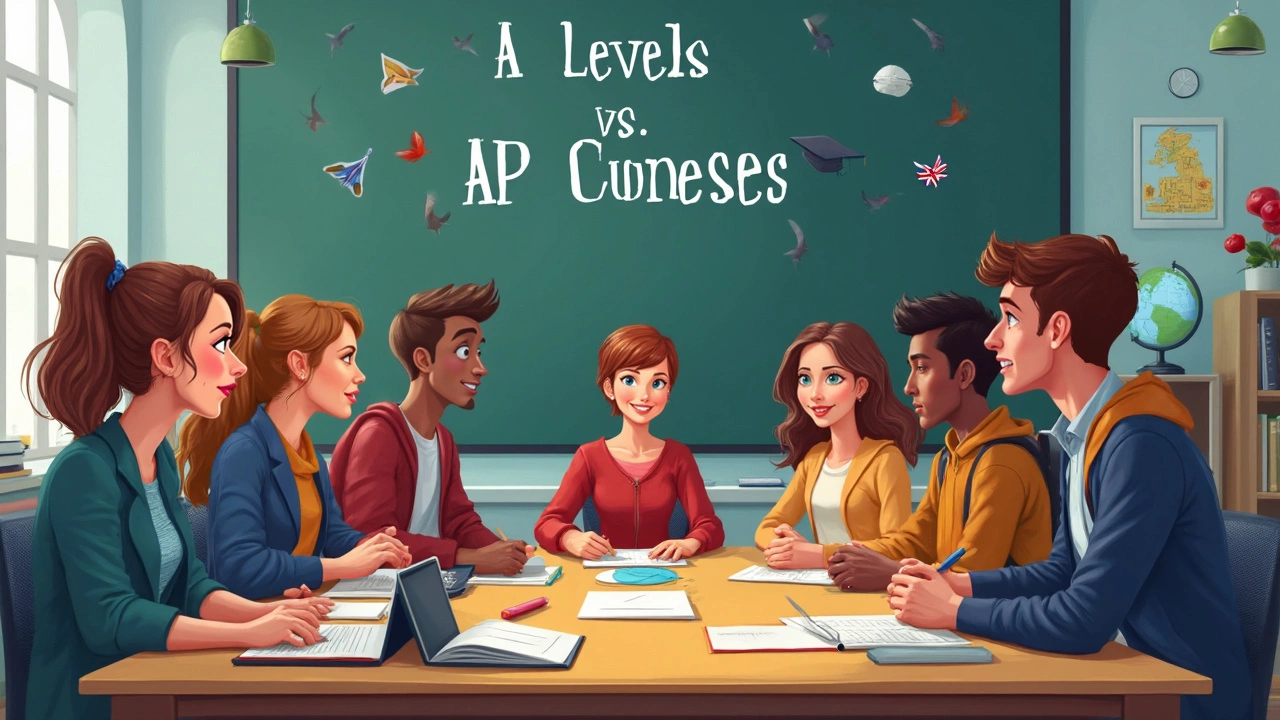-
16
- 0

Understanding the American Equivalent to A Levels: A Practical Guide
If you're pondering the American version of A Levels, you're not alone. Students and parents often find themselves juggling different education systems, trying to figure out what coursework aligns internationally. So, here's the lowdown: the American high school diploma and Advanced Placement (AP) courses are probably the closest match to the UK's A Levels, but they're not quite the same.
In the UK, A Levels are the final step before university. Students typically choose three or four subjects to study in-depth, which can make or break their university applications. In contrast, the US system has a broader approach. High school students take a range of subjects, and while they can choose to dive deeper into some via AP courses, it's not compulsory.
AP courses give students an opportunity to tackle college-level work while still in high school. They can earn college credits if they score well on AP exams, which makes them somewhat akin to A Levels in terms of academic rigor. But here's the kicker: AP courses aren't mandatory, and not every school offers the same array of subjects, unlike the more uniform A Levels.
- What are A Levels?
- American High School Diploma Explained
- Advanced Placement (AP) Courses
- Navigating College Admissions in the US
What are A Levels?
A Levels, short for Advanced Level qualifications, are a key part of the education system in the UK, primarily geared towards students aged 16 to 18. These are highly regarded qualifications that students earn before heading off to university, serving as a sort of bridge between secondary education and higher education.
The journey usually begins with choosing subjects at the start of Year 12. Typically, students select three or four subjects they are keen to explore in depth over a two-year period. It's almost like crafting your own personalized curriculum, focusing on areas that align with future academic or career aspirations. This level of specialization makes A Levels quite different from the more comprehensive approach seen in the American education system.
A Levels are split into two parts: AS (Advanced Subsidiary) Levels and A2 Levels. AS Levels are generally tackled in the first year, with exams often held at the end of that year. A2 Levels, done in the second year, are a bit more challenging and build on the AS material. Together, they form the complete A Level qualification.
Grading is on a scale from A* (the highest) to E (the lowest passing grade), and here's where it gets intense—you typically need good grades to get into top universities. So, acing these exams counts for a lot if you're eyeing prestigious schools.
Why are they important? Well, A Levels are recognized by universities not just in the UK but globally. This means they can be a golden ticket if you're applying abroad. In comparison to the American education system, where the high school diploma is crucial, A Levels are seen as a more rigorous, specialized study path.
| Subject | Typical Percentage Achieving A* |
|---|---|
| Mathematics | 17% |
| Biology | 8% |
| Chemistry | 9% |
Choosing the right subjects is a strategic move. Picking ones that not only interest you but also keep university courses in mind can make a big difference. It's definitely worth chatting with teachers and advisors to map out the best plan for these crucial couple of years.
American High School Diploma Explained
The American high school diploma is a must-have for most teens to move on to college in the U.S. It's much broader than the UK's A Levels. Think of it as collecting a set of keys throughout your school years—you grab different ones for subjects like math, science, and English.
What It Takes to Graduate
To earn this diploma, students typically need to complete roughly 24-26 credits over four years of high school. But wait, what's a credit? It's a measure of study time, often representing an hour of class per week over a year. Schools have some leeway in setting which courses and how many credits are required, although there’s a basic rundown everyone tends to follow.
- English: Usually 4 credits worth, year-round through high school.
- Mathematics: Often 3 or 4 credits, including algebra and geometry basics.
- Science: Typically 3 credits, covering biology, chemistry, and, sometimes, physics.
- Social Studies: About 3 credits, including history or government.
- Physical Education and Health: 1 or 2 credits, often a mix of gym class and learning about health.
Electives and Individual Choices
A good chunk of the high school years is also spent on electives—these are the extra classes picked by the student. They can explore interests like music, arts, or something more practical like computer science. Elective choices let students customize their education a bit, hinting at future career paths.
How Does It Compare to A Levels?
Unlike A Levels, which require early specialization, the high school diploma focuses on a well-rounded education. Students don’t strike deep in a few subjects as early as their British peers, but they gain broad-based knowledge.
The American high school system prepares students more generally, while options like Advanced Placement (AP) courses allow students to challenge themselves further, making both systems unique in their approaches.

Advanced Placement (AP) Courses
Advanced Placement, or AP courses, are a big deal if you're looking to boost your high school record in the United States. Designed by the College Board, these courses let students experience college-level academic challenges while still in high school. They cover a variety of subjects, from calculus to art history, and taking them can show universities that a student is prepared for higher-level studies.
So, what makes AP courses stand out? For starters, they’re standardized across the country, which means that if you take AP Chemistry in California, it’s the same course as in New York. This consistency helps college admissions teams gauge the level of difficulty a student has tackled, no matter where they came from.
Why Take AP Courses?
Taking AP classes can come with some significant perks. Not only do they strengthen your college application, but if you do well on the exams, you might also earn college credits. This means you could potentially skip some intro courses once in college, saving time and tuition dollars.
- Explore Interests: Students get to dig deeper into subjects they're passionate about.
- Competitive Edge: AP courses set students apart in the college admissions race.
- College Credit: Scoring high on AP exams can earn you credits, sometimes equivalent to a full semester.
But they’re not just about academic rigor; AP courses can also be a test of time management and commitment, useful skills beyond schooling.
Scoring and College Credit
AP exams are scored on a scale of 1 to 5, with 3 or higher usually considered passing. Each college has its own policy on AP credits, so it's worth checking with institutions directly to know where you stand. Some might grant you full credit for a 4 or 5 score, while others provide partial credit.
Here's a quick look at typical AP exam scores:
| Score | Qualification |
|---|---|
| 5 | Extremely well qualified |
| 4 | Well qualified |
| 3 | Qualified |
| 2 | Possibly qualified |
| 1 | No recommendation |
Remember, taking these courses is a way to not only challenge yourself but also to show colleges you're ready for what they have to offer. So if you’re up for it, AP courses could be your ticket to a strong university start.
Navigating College Admissions in the US
The journey through college admissions in the US can feel like a maze, especially if you're comparing it to the A Levels route. The first thing to understand is that US universities look at more than just your grades. It's about the whole package—academic performance, extracurriculars, personal essays, and sometimes even interviews.
Grades and Courses Matter
While the high school diploma is a critical piece of your application, it's the courses you took that schools scrutinize. Admissions officers look for rigorous coursework, and that's where Advanced Placement (AP) courses shine. They showcase your ability to handle college-level material and can give you an edge, especially if your school offers a broad selection of AP subjects.
Standardized Tests
Though their importance has been waning, SAT and ACT scores are still a factor for many universities. Some schools have even adopted test-optional policies, but high scores can still bolster your application and may be required for scholarship opportunities.
Extracurricular Activities
Your interests beyond the classroom can set you apart. Admissions teams want to see involvement in activities, leadership roles, or a significant hobby. It's not about quantity but quality—commitment and impact matter more than having your name on a dozen clubs.
Essays and Recommendations
Essays are your chance to tell your story. Who are you beyond the numbers? What challenges have you overcome? Meanwhile, strong letters of recommendation can add depth to your application, providing insight into your character and work ethic.
Admissions Statistics
To give you an idea, here's a breakdown of acceptance rates at some popular universities:
| University | Acceptance Rate |
|---|---|
| Harvard University | 4% |
| Stanford University | 5% |
| University of California, Los Angeles (UCLA) | 14% |
| New York University (NYU) | 21% |
Remember, these numbers can fluctuate annually, so always check with the universities directly for the most current information.
Navigating the US college admissions process requires planning and self-awareness. Start early, research schools that align with your goals, and prepare to tell your unique story. Don’t stress; it’s about finding the right fit, not just the toughest school to get into!
Write a comment
Tags Weight
- education
- exam preparation
- study tips
- adult education
- online courses
- adult learning
- lifelong learning
- distance learning
- GCSE revision
- online education
- private tutoring
- special needs education
- scholarships
- remote learning
- scholarship tips
- financial aid
- international students
- effective learning
- e-learning
- education funding

Written by Elara Winslow
View all posts by: Elara Winslow